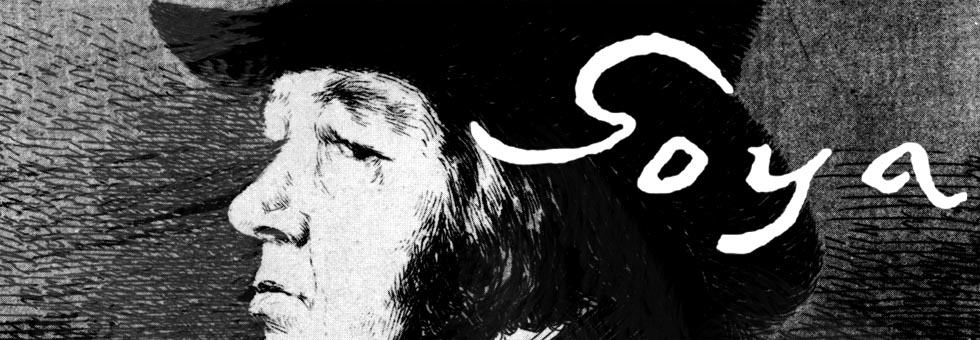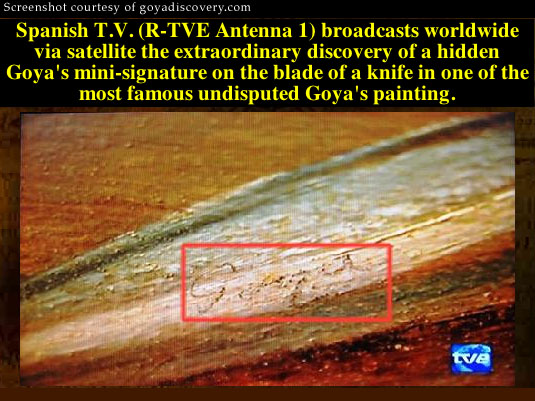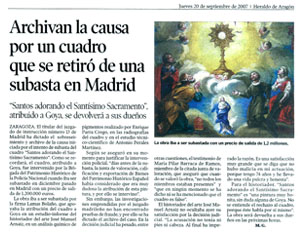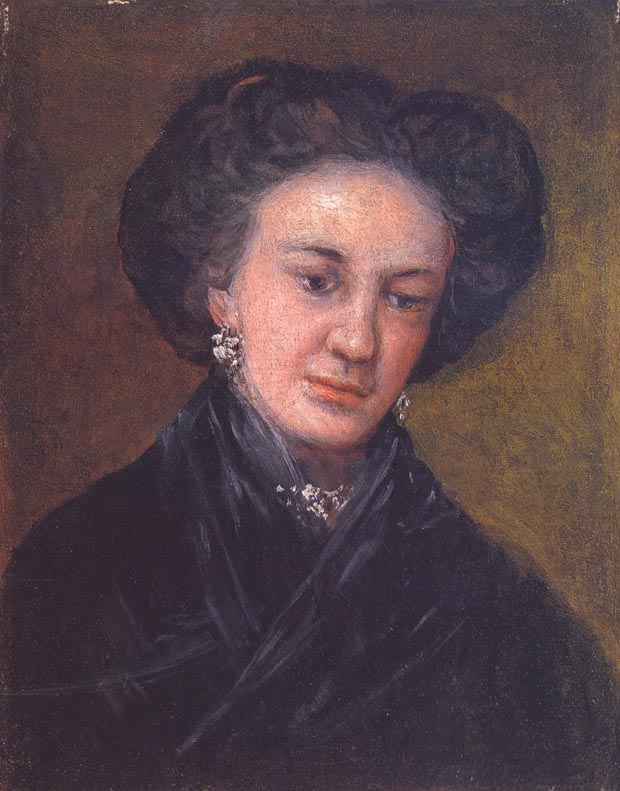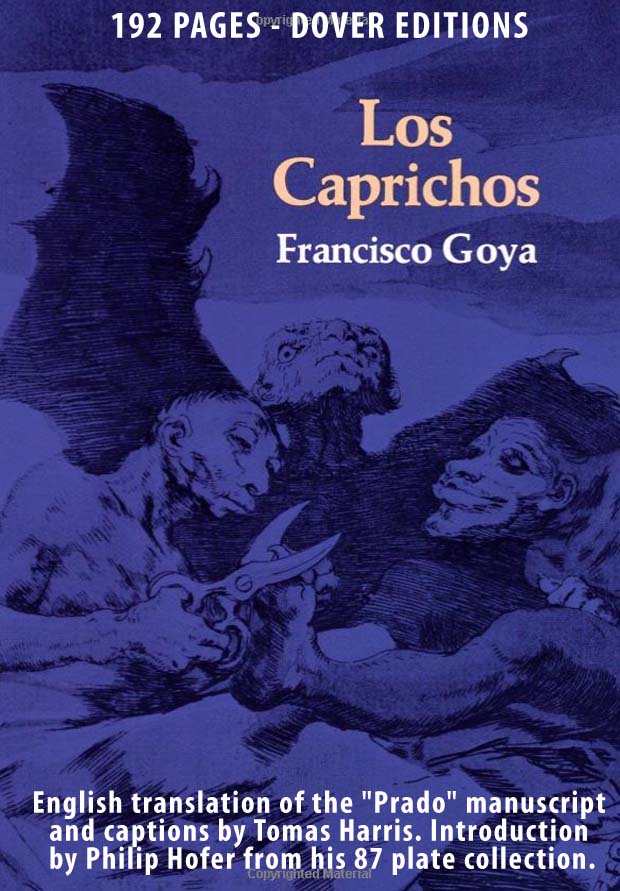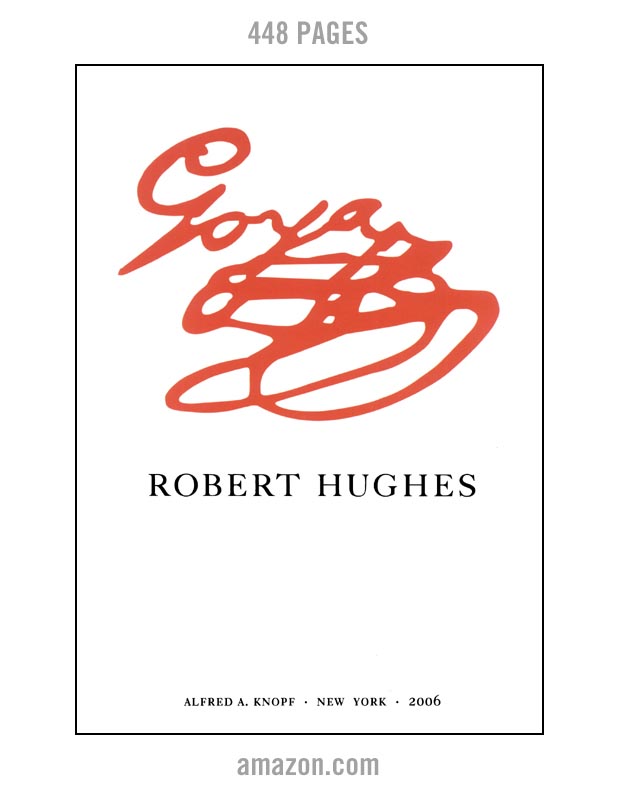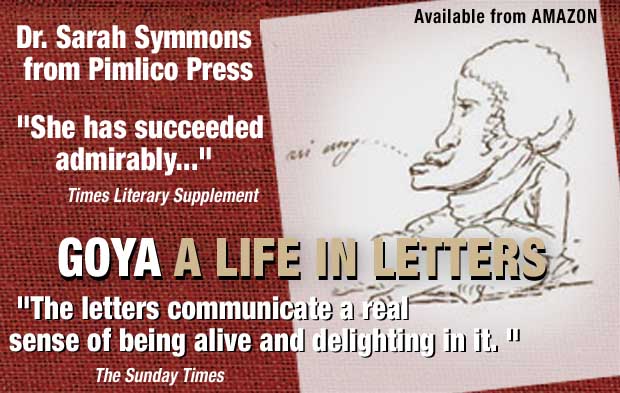Goya Archive 2007-2008
MARCH 3, 2008
Prado finds Goya "micro-signature" on 2nd of May
The Museo del Prado has discovered a "micro-signature" while cleaning varnish from the 2nd of May. The Spanish Television Channel Antenna 1 reported the news. See screenshot below:
This is particularly interesting since the 2nd of May was a painting damaged in 1937 when it was evacuated from the Prado due to aerial bombardment of Madrid by German and Italian forces. The truck carrying both 2nd of May and 3rd of May was struck by a collapsing building, and a partial restoration of the paintings was attempted later. The Museo del Prado began a full restoration and complete cleaning in February of 2008, with a scheduled completion for April. During this cleaning, when the old varnish was removed, a miniscule Goya signature was found on the knife blade that rests on the ground below the right foot of the attacker at the front of the horse of the foreground Marmaluke soldier. [See image below to show knife blade location]
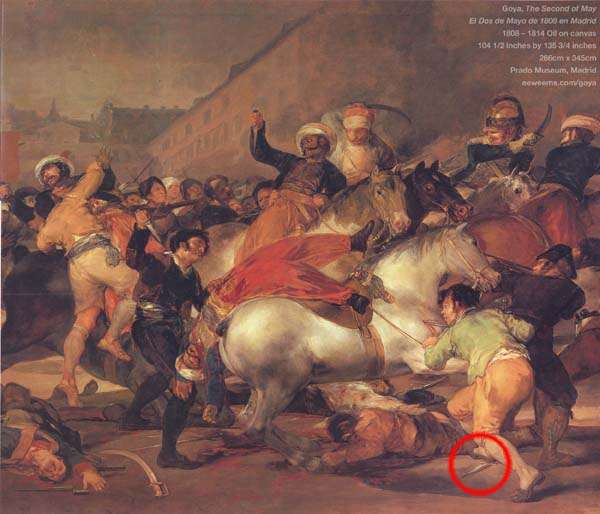
[Below] Detail image of the painting prior to cleaning:
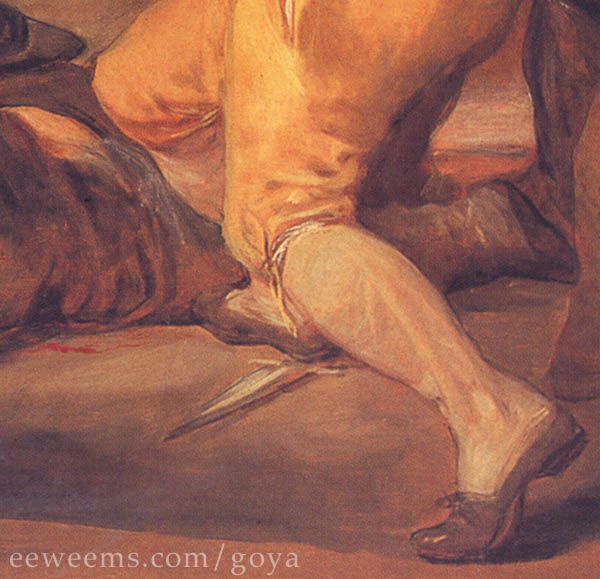
Goya 2nd of May Detail Image
This discovery provides important evidence for the the theory of micro-signatures, a long-discussed proposition that Goya deliberately placed his professional signature in near-microscopic size on innumerable paintings. For more info on micro-signatures, see our pages on Professor Perales, who is perhaps the best known exponent of this area of study.
For a counter-understanding of micro-signatures, see this news story about the "Buckley Goya" at the UK Independent newspaper online here.
This story about the 2nd of May signature discovery first broke in English at www.goyadiscovery.com who has much more information and images.
FEBRUARY 27, 2008
Prado begins work to restore 2nd and 3rd of May Paintings
The Museo del Prado has begun a major restoration effort on Goya's 2nd and 3rd of May paintings. Story from the Agent France-Presse at Breitbart.com:
"Spain's Prado museum is restoring two of Francisco de Goya's most celebrated paintings which were damaged during the country's 1936-39 civil war, a museum official said Wednesday.
The aim is to have the paintings, which have been on display at the Madrid musuem, restored in time for an exhibition of the artist's works called "Goya and the War Years" which gets underway on April 14, said Manuela Mena who is in charge of conserving Goya's 18th century works.
"The decision to restore them was taken in 2000 at a big international meeting of Goya specialists," she told AFP.
The exhibition at the Prado, one of Spain's top museums, will run until July 13.
The two paintings, "Charge of the Mamelukes" and "The Shootings of May 3rd", were damaged when they were transported from Madrid to the Mediterranean port of Valencia to protect them from the bombings in the Spanish capital."
Our pages on these paintings: 2nd of May and 3rd of May.
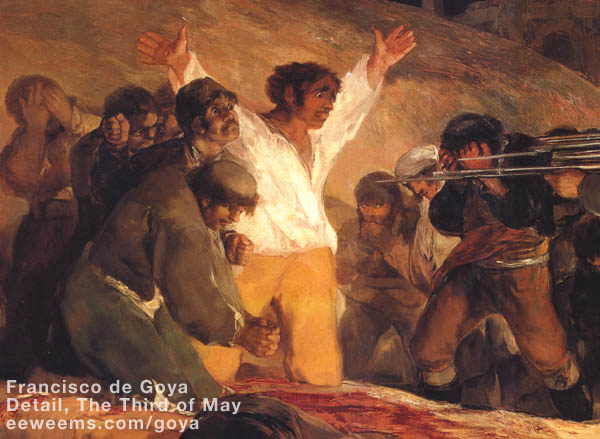
GOYA: THE THIRD OF MAY
FEBRUARY 20, 2008
MILOS FORMAN HONORED
The Museum of Modern Art hosted Milos Forman and a slate of his films, including Goya's Ghosts, recently. This preview of the event by Bruce Bennett at the New York Sun mentions a rarely heard defense of the merits of the film:
"But MoMA isn't focusing solely on the hits. Released in the era of punk rock and disco, 1979's "Hair" is a faithful and endearingly energetic adaptation of the canonical Broadway stage phenomenon that failed to click with first run audiences. Twenty years later, "Goya's Ghost," a robust and genially cynical re-creation of the Spanish Inquisition, was also curiously ill-received by mainstream critics and moviegoers alike. But, like the rest of Mr. Forman's unimpeachably high-caliber films, "Goya's Ghost" was masterminded by an artist who endured the loss and suffering that are an inevitable byproduct of history in the making and who has always made sure that tears, pain, and laughter never took a back seat to heroism and pageantry in his period films."
The Museum of Modern Art has a web page on the event here. [FYI: the event occurred February 14, 2008. ]
DECEMBER 18, 2007
Goya study of Marie Luisa authenticated
The Taft Museum in Cincinnati, USA, has seen it's portrait study of Marie Luisa demoted and then promoted to "official" authorship by Goya recently. Writer Sara Pearce discusses this at the Cincinnati Enquirer online :
"Goya painted nine portrait studies from life - four were completed by his workshop and five were left unfinished - for his masterful "Family of Charles IV" (1800-1801). It's a work that's been called the "first modern portrait" by scholars, because he painted the royal family "just as they were," says Taft director Eric M. Lee.
Before this, Lee says, state portraits flattered the sitters. "They were made to look better. But here he is painting the family exactly as he sees them, warts and all. What is modern is that it's not flattering."
...Years ago, scholars demoted the Taft and Met paintings to the lowly status of being by a "follower of Goya," partly based on the images but also based on their size: neither matched the ones in the Prado.
Recently though, London-based scholar Juliet Wilson-Bareau found an inventory from 1814 listing all the studies as the same size as the Taft and Met paintings.
She's written a number of books on Goya and had enough clout to get the Prado to take another look at its paintings, which they discovered had been cut down."
The Taft Museum of Art web site is here. [FYI: I could not find specific Goya information on their site. ]
The Old Masters and "secret symbols"
The United States based television channel "The Discovery Channel" broadcast a program titled "Da Vinci's Lost Code" on December 17, 2007, which discussed the use of science to investigate the presence of symbolisms and hidden artifacts within a painting in order to authenticate authorship. Writer Patrick Kiger writes about this programs subject at the Discovery Channel site (here):
"While digital analysis of artwork has not yet gained wide acceptance in the art world, it could be the wave of the future. But even now, science already plays a major role in differentiating frauds and copies from genuine masterpieces. As McCrone once put it, whether a scientific authenticator judged a painting to be genuine or a fraud, the expert "can be more confident in that belief than anyone who lacks objective scientific evidence."
The role of experts that use measurable scientific methods to investigate a painting's authenticity has been controversial, particularly in the case of Goya (for example, see these articles on Professor Perales here and the issues arising from the recent court proceedings over Goya's Saints Adoring the Sacrament - - scroll down for news items).
The role of the "eye" trained expert who can distinguish authorship of style by merely looking at a painting, along with scholarly research for provenance and records of a painting's historical existence, are beginning to merge with that of the trained lab technician. This is changing the industry of art sales and auctions, as paintings once dismissed as fakes are given new chances to prove their authenticity; likewise, paintings long certified can now be called into question upon grounds having to do with with something other than a preponderance of majority opinion. How peaceful this merging will be is yet to be decided.
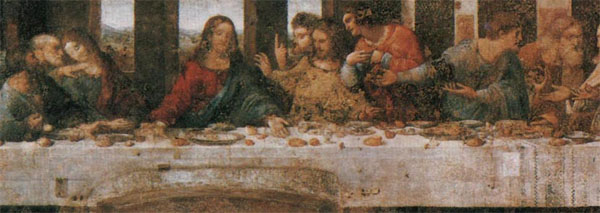
"Goya's Ghosts" on dvd
The Milos Forman movie about Goya and the politics of Spain of his period comes to DVD release on February 26th, 2008. Our page about this film is here.
NOVEMBER 8, 2007
Spanish courts order the return to owners of disputed Goya painting
While at auction in Lamas, Spain, Goya's painting "Saints Adoring the Holy Sacrament" (reserve price at 1.2 million euros; 1.5 million USD) was seized by the "Historical Heritage unit" of the police. It had been accused of being a fake by the "Junta de Valorizacion del Patrimonio Nacional" in Madrid, a deliberative body charged with the "protection of Spain's cultural history." (See this PDF file which outlines the legal powers that governs the groups activities within the European Union, i.e., "Authority for the national protection and for objects of cultural interest.")
In news reports following the seizure, some articles stated that one of the certificates of authenticity was faked. I read of ventured opinions that the painting was probably the product of a Renaissance-era painting studio. In May, court proceedings revealed that the decision about the authenticity of the painting by the "Junta" had been based only upon examination of a photograph, and that the decision rendered was not unanimous. Goyadiscovery and the Spanish language Heraldo are reporting that Pilar Barraca, who was a member of the "Junta" for six years, and was a witness at the May court trial, has resigned. Counter suits are being prepared by the injured parties.
The authentication work on the painting before it went to auction in 2006 was done by Dr. Juan Arnais, Professor Antonio Perales Martinez and Dr.Entique Parra Crego.
At the time of the seizure in December 2006, it followed just weeks after a similar debacle over a disputed Velázquez painting which was being sold for nearly 1.2 million USD. Following this, most news reports covering the subsequent Goya painting seizure repeated the charges of the Goya painting being a fake often without adding the word "disputed."
(See our earlier story on this imbroglio here).
Round-up of related links:
Goyadoscovery.com is covering this closer than anyone, with direct access to Spanish news here.
New York Times on the original Dec 2006 seizure here.
sGallery.net with a brief report from Dec 2006 here.
TypicallySpanish on the original seizure here.
"Director's cut" of Goya's Ghosts to come?
The Charleston Post and Courier newspaper has an interview with Goya's Ghosts director Milos Forman, where he talks about putting together the extended "directors cut" of his famous Mozart bio film "Amadeus," and about his much more recent Goya's Ghosts:
"The nucleus of that film started developing 50 years ago when I was a studentat the film school in Prague. I was reading a book about the Spanish Inquisition, and could not believe that the same things were happening around me in the middle of the 20th century: people being arrested — nobody knew why. People being accused of crimes they never committed. People confessing under torture. I wondered, 'How is this possible?'
"Twenty years later in Madrid, seeing for the first time his work in the Prado museum, Goya's paintings seemed like illustrations for the book I read in the '50s. Somehow the movie grew out of this experience."
The full article is here.
Man charged in Goya theft case
In February we carried news reports of the 2006 theft of Goya's "Children with a Cart" whilst en route to the Guggenheim Museum "El Greco to Picasso" show in New York City. Now the F.B.I. thinks they have the culprit. The Kansas City Star newspaper reports:
"Susan Tranquada said she wasn’t impressed when her boyfriend showed her an old painting last year that he said he’d found in the basement.
“When you look at it, the faces of the children, they’re scary,” she said Wednesday.
On Tuesday, federal authorities arrested the trucker and charged him with stealing the work — an 18th-century masterpiece by Francisco de Goya y Lucientes that had been swiped from a truck on its way to the Guggenheim Museum in Manhattan last November.
Steven Lee Olson contacted the FBI last year, telling the agency he had found the 1778 oil painting, “Children With a Cart,” in the basement of a rented home in Succasunna, N.J., Assistant U.S. Attorney Seth Kosto told a federal judge in Newark on Wednesday.
Olson contacted his lawyer, who arranged to turn the painting over to the FBI at his Hackensack office.
So Tranquada said she was shocked when agents burst into their apartment late Tuesday."
The Associated Press has more here.
Something we missed when it was originally reported:
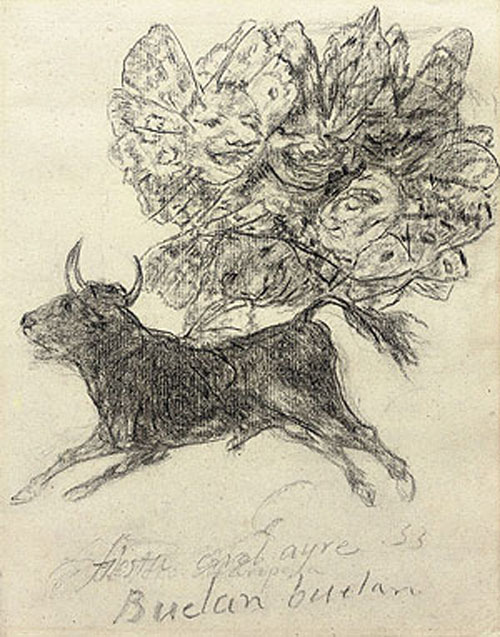
Goya drawing "Bull and Butterflies" sells for 1.9 million euros
The "El Toro Mariposa" was purchased by the Spanish Ministry for Culture in December of 2006. The drawing measures 19cm by 15cm and dates from Goya's years in Bordeaux.
OCTOBER 23, 2007
Long before the Carlos Saura movie Goya in Bourdeaux (2001) and the recent Milos Forman Goya's Ghosts (2006) there was the Anthony Franciosa and Ava Gardner starring The Naked Maja (1958) (French title La Maja nue). Not a highly ranked film with most film critics, and considered to have a rather detached usage of the actual facts of both Goya and the Duchess of Alba (played by Ms. Gardner) life, the movie is nonetheless a real effort as depicting Goya as a hard-working artist.
AUGUST 27, 2007
Goya's ghosts
Roger Ebert, the "dean" of American Movie critics, weighs in on the Milos Forman Goya film starring Natalie Portman:
"Milos Forman's "Goya's Ghosts" is an extraordinarily beautiful film that plays almost like an excuse to generate its images. Like the Goya prints being examined by the good fathers of the Inquisition in the opening scene, the images stand on their own, resisting the pull toward narrative, yet adding up to a portrait of grotesque people debased by their society.
The priests lament Goya's negative portrait of Spain, which shows remarkable prescience on their part, since they're condemning in 1772 prints that were not created by the painter until 1799.
...There are so many dramatic incidents, indeed, that it's hard to figure out who the central figure is supposed to be. Lorenzo gets top billing, but they're all buffeted by the winds of fate. I didn't feel the strong identification with anyone that I had with Forman's "Amadeus," but as consolation I was able to watch enraptured at a visual portrait of a time and place."
Ebert's Reviews are at the Chicago Sun-Times here.
JULY 26, 2007
Goya Caprichos in Forida
An exhibit of a complete first edition of the Caprichos etchings will be on exhibit in Sarasota, Florida beginning Sept 27th, 2007:
Goya was one of the first artists to produce art that combined his own experiences and perspective on society with the pictorial and symbolic tools of fantasy and the imagination,” says Dr. Stephen Borys, Ulla R. Searing Curator of Collections at the Ringling. “This exhibition of his famous Los Caprichos prints, which were produced in 1799 at the height of the Enlightenment, is an exciting complement to the contemporary show, Cuba Avant-Garde, on view at the same time, as both offer powerful social and political commentaries on artmaking and society.”
Francisco Goya: Los Caprichos exhibition consists of a complete first edition of Goya’s Los Caprichos suite, along with examples of the artist’s earliest etchings, including works from his other graphic series: Los Desastres de la Guerra, Los Proverbios, and La Tauromaquia. Additionally, two other works inspired by Goya’s famous prints, a drawing by Edward Hagedorn from 1951 and eight etchings by Enrique Chagoya from 1999, are included in the exhibition.
The John and Mabel Ringling Art Museum is hosting the exhibit. Web site page here.
Information about admission costs and the Museum itself:
General Admission includes the Ringling Museum of Art, special exhibitions,Cà d’Zan Mansion, Circus Museum,Mable’shistoric Rose Garden and Florida’s only rose test gardens, all on 66 acres of lushly landscaped grounds. Adults are $15; senior citizens (65 and over) are $13; children ages 6-17 are $5. Free Admission for children 5 and under accompanied by an adult, museum members. Advance tickets are available by calling 941.358.3180. Visit for more information.
The John and Mable Ringling Museum of Art, with Florida State University, is the largest museum/university complex in the nation. It preserves the legacy of John and Mable Ringling, educating and enabling a large and diverse audience to experience and take delight in a world-renowned collection of fine art; Cà d’Zan, the Ringling historic mansion; the Circus Museum; the Original Asolo Theater; and historic architecture, courtyard, gardens and grounds overlooking Sarasota Bay.
Goya Ghosts in USA
The Milos Forman movie is now playing in the United States, though with quite mixed reviews as to its quality:
From Carina Cochino at the New York News:
Goya's Ghosts is Milos Forman's first film since 1999, but you sincerely wish it wasn't. A logy, rambling period piece, it feels about as far from the spirit of "Amadeus" as it's possible to get with wigs and britches.
Focusing only incidentally on its title character, the new film wanders distractedly around 19th- century Spain in search of a cohesive idea or, failing that, a through line, but it doesn't come up with much beyond the hard-to-dispute observation that power is a gateway to hypocrisy.
In the first half of the film, Goya is marginally involved in some Inquisition intrigue involving Natalie Portman's naked torture and subsequent fondling by a priest. Timely as the themes are, they have little to do with Goya except as they concern his role as a well-connected go-between.
Played by Stellan Skarsgard, the great Spanish painter not only remains a passive bystander in his own story but a credulous dupe besides. It's hard to square this image of a genial but definitely slow-on-the-uptake Goya with his work.
...The biggest ghost in the movie is Goya himself.
A review by Bruce Newman from the Mercury News:
Goya's Ghosts doesn't even bother to paint for itself a biographical fig leaf: It essentially ignores the life of the artist considered by many to be the link from Europe's old masters to the modernism made famous a century later by Picasso, another Spaniard.
In fact, the film's Goya (Stellan Skarsgard) is reduced to a role scarcely more exalted than the contemporary courtroom artist.
...There's an unfortunate tendency in this movie for the forces of history to overtake scenes, so that just as Goya is about to have his head handed to him by King Charles, someone rushes in to announce that Louis XIV has been beheaded in France. Similarly, just as Goya is about to meet Alicia (also played by Portman), the illegitimate daughter of Ines, soldiers burst in on them.
"Goya's Ghosts" then tries to bring history full circle with the re-institution of the Inquisition, but by then you're awaiting an announcement about the next troop surge and the rise in sectarian violence.
See the trailer for the film at the official film site here at goyasghoststhefilm.com
Our page on the film is here.
JULY 5, 2007
Goya Ghosts opens soon in USA
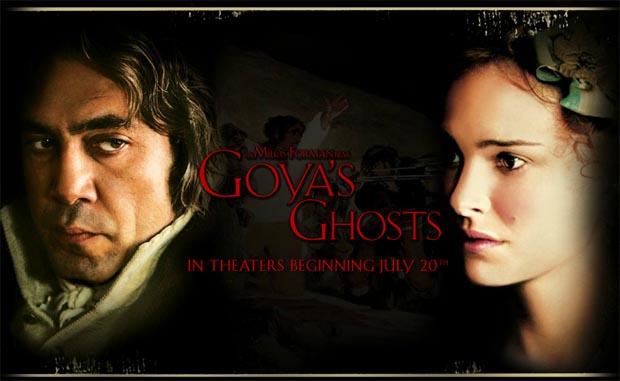
From a review at moviesonline:
"Set against the backdrop of political turmoil at the end of the Spanish Inquisition and start of the invasion of Spain by Napoleon’s army, the film captures the essence and beauty of Goya’s work which is best known for both the colorful depictions of the royal court and its people, and his grim depictions of the brutality of war and life in 18th century Spain.
JAVIER BARDEM is Brother Lorenzo, an enigmatic, cunning member of the Inquisition’s inner circle who becomes infatuated with Goya’s teenage muse, Ines (NATALIE PORTMAN), when she is falsely accused of heresy and sent to prison. The film stars an impressive ensemble cast including Bardem, Portman and Skarsgard as well as strong supporting roles from Randy Quaid, Michael Lonsdale, Jose Luis Gomez and Mabel Rivera."
Another reviewfor the film is at Starpulse.com
See the trailer for the film at the official film site here at goyasghoststhefilm.com
Our page on the film is here.
JUNE 26, 2007
Controversy over Goya's Santos Adorando el Santisimo Sacramento
As reported here on December 29, 2006, and at other web sites (particularly at goyadiscovery.com which has been watching the case closely) the Goya painting "Saints Adoring the Holy Sacrament” was pulled from auction in Madrid by police because of accusations against its authenticity by experts connected with the Museo del Prado. The case against the painting was recently dismissed by Magistrate Don Hermenegildo Alfredo Barrera Aguirre in Madrid.
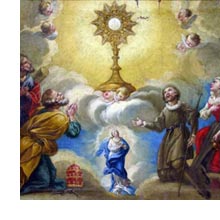
The painting had been previously authenticated by Jose Manuel Arnaiz, Enrique Parra Crego of the University Alfonso, and by Professor Antonio Perales Martinez. (Read about Dr. Perales here)
Countersuits are expected against the original accusing parties.
Beyond the issue of just this one painting is the problem of the millions of dollars that an authentic Goya painting can be expected to bring at sale, and the tension in the art world over who will hold the accepted credentials for being a "Goya expert." Techniques of authentication are also held up to scrutiny in these cases, and advances in forensic science has added threat to the pure eye technique from previous years in which an opinion rendered from viewing photographs of a disputed painting could be enough to label a hitherto questioned painting a "true Goya" (or cast a long accepted painting as by Goya into a limbo of authorship, read for example the issues abounding over Goya's Milkmaid of Bordeaux). The trend is now toward a combination of scholarship and analysis of the physical properties of a painting, techniques that are evolving rapidly, and can require multiple participating parties in order to bring about a fully rounded opinion.
Our information on this story from December 2006 is here.
A page about the changing world of Goya authentication here.
Goya portrait of Rita Moon
We missed this earlier this year: Goya's oil on linen portrait of actress Rita Moon sold at auction for $2 million USD (2.043.702 euros), well over the pre-auction estimate of 1.5 million USD. It was in lot 55 at the Sotheby auction "Goya, Greco and Zurbaran" held in New York, January 25-26, 2007.
Our page on the portrait painting of Rita Luna is here.
JUNE 12, 2007
Goya site stats for may 2007
We had 31,577 "uniques" for May, with 114,617 page views, and 1,175,323 hits altogether.
The stats page is here.
MAY 9, 2007
Robert Hughes interview at canadianart.ca
The canadianart.ca website for the print magazine lists a new interview with the Goya book author Robert Hughes: 31577
"Hughes is one of only a handful of critics with a reputation that extends beyond the art world. He made his name in North America as the long-standing art critic at Time magazine, a post from which he reached 400,000 readers weekly from 1970 until recently. He also wrote books like The Fatal Shore, a noted history of Australia, and other titles on art and culture, including his 2003 biography Goya, written during Hughes’s recovery from a near-fatal car accident in 1999.
A harrowing account of that accident opens the new book. It made me wonder about exactly who I would be meeting; it would certainly not be the Robert Hughes of an early Time photograph that has been my image of him over the years. That would be a younger man with curling hair, dressed in leather, posing with a burly, gleaming motorcycle. I tell him this when we meet. He walks slowly toward me, one hand on a cane, the other extended to shake hands. “You’re meeting a broken man,” he says, but the voice and smile say otherwise."
The web site page is here.
Goya Stats
This web site had 29,843 unique visitors in April 2007, for a total of 107,283 page views. The most popular page was the artwork index page here. After that is the page on Saturn and our general page on the Natalie Portman Goya movie "Goya's Ghosts."
MAY 7, 2007
Review of "Goya's Ghosts" movie & inteview with Natalie Portman
The Belfast Telegraph has coverage of the Milos Forman movie and it's star. Article and interview written by Andy Welch:
"It wasn't a period of history I knew much about, hardly anything at all, but I learned all about it prior to filming," Natalie admits. " The only thing I knew about the Spanish Inquisition beforehand was probably from the Monty Python sketch or History Of The World," she laughs.
"I knew Goya's paintings very vaguely - I'd been to the Prado gallery once before, but luckily, because we did all the pre-production work in Madrid, I got to go there every day for a month. There was an art historian that took me around and explained everything to me - it was really quite amazing."
When the offer of the part came through, Natalie didn't have to think very hard about whether to accept it.
"Working with Milos Forman was the biggest draw. I mean, he's one of the all-time greats. When he called I was absolutely over the moon, I was smiling for weeks after.
"He doesn't seem to work much these days, but he's very specific. Look at the work he's done - One Flew Over The Cuckoo's Nest, Amadeus and Man On The Moon, I loved that."
Complete Web page story at the Belfast Telegraph here.
The BBC is also running news stories on Portman and the release of Goya's Ghost's:
"Goya's Ghosts, directed by Oscar-winner Milos Forman, sees her play Ines, the daughter of a Spanish merchant.
Portman plays a mother and daughter in the film
Her beauty leads to her becoming the muse of the painter Goya - but also to her being thrown into jail, only to re-emerge years later as a tortured, broken soul.
She also portrays Ines's daughter, Alicia, who grows up unaware of her mother's ordeal or even her true parentage.
The 25-year-old says she relished the opportunity of such a complex set of characters.
"It was definitely exciting to get the opportunity to play what was effectively three different characters in the same movie," she says.
"I knew that was going to be really difficult but working with Milos Forman was such a great opportunity that I was not going to pass up.
..."With Alicia I was really inspired by the flamenco dancers in Spain. They were just so sexy, fiery and strong.
"They have so much personality. There was one that I saw at a flamenco performance and I just tried to channel her."
Portman says she knew next to nothing about the tempestuous period in which the film was set or about Goya, played by Swedish actor Stellan Skarsgard, around whom the film revolves."
The BBC page is here.
Sarah Symmons online audio lecture on Goya's Disparates
"Absurd Actions and Human Monsters: Goya's Underworld in the Disparates"
Dr. Sarah Symmons, who is well-known for writing a number of books on Goya (among other works), has a page on her official web site showcasing a number of recorded audio lectures. Recently added is a 36 minute presentation on Los Disparates.
See our page on Dr. Symmons here
MAY 1, 2007
New hall at Prado makes room for 1,000 Goya drawings
The UK Times online news site reports on the new construction at the Madrid Museo del Prado:
"The Prado problem has rumbled on for years. So bad were the museum’s cramped, shabby conditions in the 1990s that only a seventh of its collection could be shown; its director was forced to resign when the roof dribbled rainwater beside Velázquez’s Las Meninas.
An overhaul of the old building began, but which architect could square the circle of extending the unextendable? Well none, actually. In 1995 an international competition entered by 700 of the world’s greatest architectural brains produced two runners-up, but no winner.
In 1998 the trustees bit the bullet, recommending Moneo’s plan to build up the slope behind. And that’s when the problems really began. For up the slope lay the cloister of the Jerónimos, a 17th-century relic of an old monastery. Being a relatively modern city, Madrid has few 17th-century buildings. Every one is precious. Even this pile of old rubble, not even that fine in its heyday and now just a whisper of its former self since the French turned their cannons on it two centuries ago, and after general neglect under Franco. But the locals cared enough to go right to the supreme court. The more superstitious began to blame the site’s bad luck on a cursed underground stream said to course beneath the building.
It is testament to Moneo, a man with genius loci etched on his heart, that not only have the opposers been appeased but appeased with aplomb. Moneo’s extension is no extension. Or so it seems. This is architecture as trompe l’oeil. Until it was dug out in the 19th century, the slope to the Retiro nudged the Prado’s backside. Moneo has returned the slope and built his extension underneath, the natural rise of the hill giving him the volume required for the new temporary exhibition galleries, the auditorium, the conservation department and storage facilities – increasing the Prado’s space by 50 per cent and releasing 40 rooms in the main building for more Goyas.
...The building was three times over budget, and it shows. Tap a wall and it doesn’t reply with the cheap echo of plasterboard. Those bronze doors are the real, solid McCoy. The rooms smell of buttery leather and oiled oak. The new gallery for the Prado’s 1,000 Goya drawings feels like a humidor, floor to ceiling in rich, spicy cedar veneer."
Web page story at the Times here.
APRIL 16, 2007
Goya's Ghosts movie in USA on july 20, 2007
The Milos Forman/Saul Zaentz movie is finally coming to the United States in a limited run starting July 21, 2007. The film stars Natalie Portman. More about the movie here.
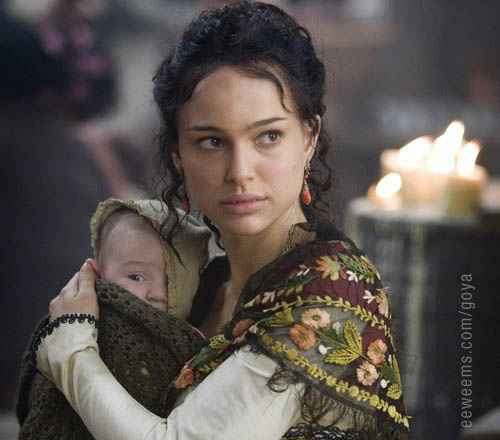
AMAZON
Goya The Terrible Sublime - Graphic Novel - (Spanish Edition) - Amazon
"From this headlong seizure of life we should not expect a calm and refined art, nor a reflective one. Yet Goya was more than a Nietzschean egoist riding roughshod over the world to assert his supermanhood. He was receptive to all shades of feeling, and it was his extreme sensitivity as well as his muscular temerity that actuated his assaults on the outrageous society of Spain." From Thomas Craven's essay on Goya from MEN OF ART (1931).
"...Loneliness has its limits, for Goya was not a prophet but a painter. If he had not been a painter his attitude to life would have found expression only in preaching or suicide." From Andre Malroux's essay in SATURN: AN ESSAY ON GOYA (1957).
"Goya is always a great artist, often a frightening one...light and shade play upon atrocious horrors." From Charles Baudelaire's essay on Goya from CURIOSITES ESTRANGERS (1842).
"[An] extraordinary mingling of hatred and compassion, despair and sardonic humour, realism and fantasy." From the foreword by Aldous Huxley to THE COMPLETE ETCHINGS OF GOYA (1962).
"His analysis in paint, chalk and ink of mass disaster and human frailty pointed to someone obsessed with the chaos of existence..." From the book on Goya by Sarah Symmons (1998).
"I cannot forgive you for admiring Goya...I find nothing in the least pleasing about his paintings or his etchings..." From a letter to (spanish) Duchess Colonna from the French writer Prosper Merimee (1869).
GOYA : Los Caprichos - Dover Edition - Amazon
